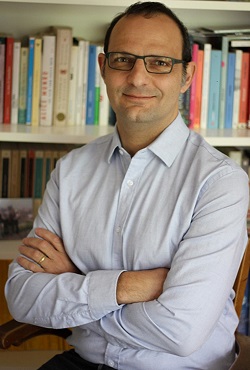Research Team
Amit Sawant, PhD
Amit Sawant, PhD (he/him), is a Professor and Vice Chair for the Division of Medical Physics in the University of Maryland Department of Radiation Oncology.
His research interests focus on developing and translating novel forms of image-guidance in radiation therapy, specifically in the area of stereotactic ablative radiotherapy (SABR), also known as stereotactic body radiation therapy (SBRT). The overall goal of his research is to fundamentally improve the understanding, diagnosis, and treatment of cancer through pre-clinical and clinical investigations, and the translation of novel forms of cancer imaging, radiobiologic agents, and precision radiotherapy. He serves as the MPI for the NCI 54 ROBIN Oligometastasis Center.
 Phuoc T. Tran, MD, PhD
Phuoc T. Tran, MD, PhD
Phuoc T. Tran, MD, PhD, is Professor in the Division of Radiation Oncology at the University of Texas MD Anderson Cancer Center. Dr. Tran is a board-certified radiation oncologist and clinically specializes in the treatment of genitourinary (GU) malignancies.
Dr. Tran's laboratory research is funded by the National Institutes of Health (NIH) and the Department of Defense (DoD). His research is further funded by foundations which focus on tumor cell epithelial plasticity programs, and novel agents to enhance the local and systemic effects of radiation and the oligometastatic state, both which improve the outcomes of patients with cancer. He is the contact principal investigator (PI) for the National Cancer Institute (NCI) U54 ROBIN Oligometastasis Center. Dr. Tran leads an active clinical trials program which includes interventional and translational investigator-initiated studies. He is the NRG Oncology Tenitourinary Translational Science Chair and the American Society for Radiation Oncology (ASTRO) Research Funding Development Committee Chair.
Dr. Tran received his MD and PhD from Oregon Health and Science University, and completed both his radiation oncology residency and postdoctoral fellowship at Stanford University. His training focused on DNA repair, cancer biology, and transgenic mouse models. He joined the faculty of Johns Hopkins University in 2009 where he served as Clinical Director and a Professor of Radiation Oncology before joining University of Maryland in 2022 where he served as Senior Vice Chair for Research, and the MD Anderson Cancer Center in 2025. He has received numerous awards for his research and clinical work from the Radiological Society of North America (RSNA), ASTRO, the Sidney Kimmel Foundation, the American Cancer Society, Uniting Against Lung Cancer, the American Lung Association, the Movember Foundation, and the Prostate Cancer Foundation. Dr. Tran was voted a "Top Doctor" in Baltimore Magazine. He also serves as a senior editor and editorial board member for Cancer Research and the Journal of Clinical Oncology.
 Nicole Simone, MD
Nicole Simone, MD
Nicole Simone, MD, is Vice Chair for Research and Faculty Development, the Margaret Q. Landenberger Endowed Professor of Radiation Oncology, and the Leader of the Cancer Risk and Control Program of the Sidney Kimmel Cancer Center at Thomas Jefferson University. She is also the Radiation Lead for the Jefferson Health Breast Care Center.
Dr. Simone's research focuses on how caloric restriction, or a reduction in overall calories, can augment the response of chemotherapy and radiation, and inhibit tumor growth and metastases to improve survival in both breast cancer and prostate cancer patients. Her laboratory is funded by the NCI. She incorporates knowledge gained in the laboratory and applies it directly to patients with three open clinical trials incorporating diet with breast cancer, prostate cancer and endometrial cancer treatments. She is the multiple principal investigator (MPI) for the NCI U54 ROBIN Oligometastasis Center. She also consistently serves on four national grant review study sections, and was appointed to the NRG Oncology Breast Cancer Committee and Cancer Prevention and Control Committee.
As one of the women's cancer multidisciplinary leaders reaching across the Jefferson network of hospitals, Dr. Simone has used her basic and translational science skills to discerningly develop a clinical trials program which offers the best and most cutting-edge clinical trials to patients. She also leads the Jefferson breast cancer research program and has spearheaded their nutrition, inflammation and metabolism working group in a collaborative effort with Drexel University to develop a thematic program for successful multidisciplinary funding.
 Lei Ren, PhD
Lei Ren, PhD
Lei Ren, PhD, is Professor and the Director of Medical Physics Research for the University of Maryland Department of Radiation Oncology. He is also a clinical medical physicist board-certified by the American Board of Radiology (ABR) and a leading scientist in medical imaging and radiation therapy.
His seminal research focuses on image-guided radiation therapy (IGRT), and the development and application of artificial intelligence (AI) in radiation therapy.
Dr. Ren conducted some of the first studies developing digital tomosynthesis (DTS) for fast, low-dose target localization in radiation therapy, which led to the development of the limited-angle intrafraction verification (LIVE) system for intrafraction verification in radiotherapy. His group also developed novel cone-beam CT (CBCT) scatter reduction and correction methods, DTS/CBCT/MRI image reconstruction methods using prior information and motion modeling, and 4D-CBCT sorting and reconstruction algorithms.
In recent years, Dr. Ren's lab group has focused on developing and implementing AI for radiation therapy applications. His research areas include developing novel AI, especially deep learning techniques for deformable image registration, image synthesis, image reconstruction, image enhancement, 4D imaging, digital phantom generation, clinical decision making, radiomics, and outcome prediction.
The overall goal of Dr. Ren's research is to develop novel imaging and therapy technologies to improve the precision and outcome of radiation therapy treatments with high efficiency and minimal imaging dose.
 Mark Mishra, MD
Mark Mishra, MD
Mark Mishra, MD, is a Professor of Radiation Oncology at the University of Maryland School of Medicine, the Vice Chair for Clinical Research for the Department of Radiation Oncology, the Associate Director of the University of Maryland Cancer Networks, and the Vice-Chair of the Greenebaum Comprehensive Cancer Center’s (UMGCCC) Clinical Research Committee.
He is a graduate of the University of Cincinnati College of Medicine and completed his residency in radiation oncology at Thomas Jefferson University, where he served as chief resident. He completed a clinical research fellowship in the NIH clinical research training program, and also completed the program in clinical effectiveness at the Harvard T.H. Chan School of Public Health.
As the Vice Chair Radiation Oncology Clinical Research, Dr. Mishra oversees all clinical trial activities for radiation oncology at UMGCCC and affiliated practices across the state of Maryland. He serves as the UMGCCC voting-member contact PI for NRG Oncology.
Dr. Mishra focuses on the treatment of patients with tumors of the central nervous system and genitourinary tract, as well as breast cancer. Dr. Mishra’s research focus is centered on evaluating the comparative- and cost-effectiveness of new and complex radiation technologies including proton beam therapy, as well as evaluating novel uses of radiation therapy alone or in combination with other therapies. He has received the American Society of Radiation Oncology (ASTRO) comparative effectiveness grant, and is the comparative effectiveness co-chair for two recently activated national phase III studies (NRG BN009 and NRG CC009) focused on identifying new treatment approaches for brain metastases. Dr. Mishra is also the PI for two investigator-initiated trials at UMGCCC evaluating the efficacy of combining laser interstitial thermal therapy with radiation for patients with a recurrent glioma, as well as patients with a newly diagnosed unresectable glioma.
 Luigi Marchionni, MD, PhD
Luigi Marchionni, MD, PhD
Luigi Marchionni, MD, PhD, is an Associate Professor of Pathology and Laboratory Medicine at Weill Cornell Medicine (WCM), and he is also the Co-Chair for and Director of the Division of Computational and Systems Pathology.
He has extensive experience in the analysis and interpretation of multi-omics data, especially for the development of biomarkers. Prior to joining Weill Cornell Medicine, he was Associate Professor of Oncology at the Johns Hopkins University (JHU), where he also served as Co-Director of the Center for Computational Genomics (CCG).
Dr. Marchionni is trained in medicine at the University of Turin, Italy, and earned a PhD in structural and functional genomics at the International School for Advanced Studies (ISAS-SISSA) in Trieste, Italy.
His past and current research focuses on knowledge integration across different “omics” domains, developing novel classification algorithms for cancer prognostication and prediction, and on the integration of omics-based predictors into current clinical management of cancer patients. He will provide cross-disciplinary expertise in the analysis and integration of multi-modal omics and digital pathology data to support the scientific mission of the U54 program.
Erika Davies, PhD, MS
 Erika Davies, PhD, MS (she/her), is an Assistant Professor of Radiation Oncology and the Director of the DTRS Medical Countermeasure Program at the University of Maryland School of Medicine. She has over ten years of experience in managing scientific programs for the federal government and scientific nonprofit agencies. Most recently, she served as the Contract Officer Representative (level III) for a ~$20M portfolio of funded contracts as a Project Officer at the Biomedical Advanced Research and Development Authority (BARDA), serving as subject matter expert and technical advisor, point-of-contact between awardees and BARDA, and contract manager.
Erika Davies, PhD, MS (she/her), is an Assistant Professor of Radiation Oncology and the Director of the DTRS Medical Countermeasure Program at the University of Maryland School of Medicine. She has over ten years of experience in managing scientific programs for the federal government and scientific nonprofit agencies. Most recently, she served as the Contract Officer Representative (level III) for a ~$20M portfolio of funded contracts as a Project Officer at the Biomedical Advanced Research and Development Authority (BARDA), serving as subject matter expert and technical advisor, point-of-contact between awardees and BARDA, and contract manager.
Dr. Davies received her PhD from Uniformed Services University and completed a post-doctoral fellowship at the National Institutes of Health/National Institute of Allergy and Infectious Diseases (NIAID). Her fellowship focused on host-parasite interactions in a murine model of Toxoplasma gondii in the Laboratory of Parasitic Diseases.
Administrative Team
 Miek Segers, BS
Miek Segers, BS
Miek Segers is the Research Program Administrator for the Department of Radiation Oncology at the University of Maryland. She has over 20 years of experience in grants management, financial oversight, and compliance monitoring at both the departmental and institutional levels. She has deep experience in managing funding and research in the radiological sciences, as well as extensive expertise in the management of multi-institutional funding initiatives, documented compliance with evolving federal and security requirements, and budgetary planning, monitoring, and oversight. She ensures adherence to sponsor and state guidelines regarding funds distribution, personnel, as well as sub-award management, progress reports, and financial reports.
 Caitlin Eggleston, MPH
Caitlin Eggleston, MPH
Caitlin Eggleston is the Director of Clinical Research for the University of Maryland Radiation Oncology Department. She has over seven years of clinical trials experience within the field of oncology. Currently she assists with the development of new trials, oversees the clinical trial portfolio, and trains the clinical research staff. Her educational background includes a Bachelor of Science in biology and she is currently completing her Master of Public Health.
Nicole Helie
 Nicole Helie (she/her) is a Project Manager who specializes in clinical research and human subjects research in the field of oncology. She currently works in the University of Maryland Department of Radiation Oncology. Previously, she worked as a Research Program Coordinator at Johns Hopkins University School of Medicine in the Department of Neurosurgery, managing a multitude of trials and disease groups. Nicole believes that integrity is integral to research and strives to exemplify that in every aspect of her professional career.
Nicole Helie (she/her) is a Project Manager who specializes in clinical research and human subjects research in the field of oncology. She currently works in the University of Maryland Department of Radiation Oncology. Previously, she worked as a Research Program Coordinator at Johns Hopkins University School of Medicine in the Department of Neurosurgery, managing a multitude of trials and disease groups. Nicole believes that integrity is integral to research and strives to exemplify that in every aspect of her professional career.
She is currently the project manager for the TERPS clinical trial, a pivotal trial in metastatic prostate cancer research, that includes the Molecular Characterization Trial (MCT) of the U54 grant. She works closely with Dr. Phuoc Tran, the translational lab, and the clinical trial participants to ensure that both patient and research needs are met.
Nicole graduated from the University of Maryland, College Park with a Bachelor of Science in biochemistry with an emphasis in genetics. She also minored in philosophy with interests in ethics and the philosophy of science. Currently, she is looking to further her education by applying to a master's program so that she can continue to positively contribute to her position within University of Maryland in Baltimore.
Follow Us On X:
 The ROBIN OligoMET Center: https://x.com/ROBINOligoMETC
The ROBIN OligoMET Center: https://x.com/ROBINOligoMETC
Department of Radiation Oncology: https://x.com/UMarylandRadOnc

